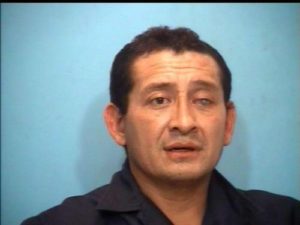This article was originally published on the author’s personal blog on February 25, 2015. It has been republished here to serve as background information for a follow-up piece that ran at Anti-Media on March 16, 2017.
On February 11 a Texas jury awarded $2.4 million to the family of Robert Montano, an inmate of the Orange County Correctional Facility who in 2011 died while in custody. Montano, who’d been arrested for public intoxication, passed away after spending five days in an isolation unit of the jail known as “the Bubble.”
Less than a week after the jury’s ruling an Assistant District Attorney for Orange County filed a motion requesting that a federal judge void the monetary award. ADA Doug Manning claimed the evidence presented by the family’s attorneys was insufficient to support the jury’s decision and that, in point of fact, the evidence itself is “an issue of law to be determined by the judge.”
Robert, 41 at the time of his death, had a history of me
spent time as a patient at a psychiatric institution in nearby Beaumont, suffered from paranoid schizophrenia. And as it would become tragically apparent through various investigations related to the case, much of the circumstances surrounding Montano’s arrest, incarceration, and subsequent de
ath, hinged upon his mental state.
ACTING ON ASSUMPTION
In October of 2011 the Orange County Sheriff’s Department was dispatched to the Montano residence when a neighbor, suspecting Robert to be under the influence of bath salts, placed a call to authorities. According to Montano family attorney Ryan MacLeod, the responding sheriff’s deputy made contact with his suspect—an oddly behaving Robert who was ranting about someone trying to kill him—in the man’s own front yard. The deputy, linking the behavior to the alleged use of bath salts, arrested Montano on misdemeanor public intoxication.
For those unfamiliar, the term “bath salts” is parlance for any of a number of synthetic drugs that, while resembling the crystals or powders of actual bath salt products, are prone to causing hallucinatory effects in users.
Once at the jail, Robert was confined to “the Bubble” for observation. The licensed vocational nurse on duty when Montano was booked noted in Robert’s file that the inmate had “been taking bath salts prior to arrest.” But as reported by the Beaumont Enterprise, that same nurse testified in federal court that she “should have used different wording in the entry” because, in truth, she’d simply “heard from someone—she was unable to recall whom—that Montano might have used bath salts.”
It’s important to note that at the point Montano was booked into the Orange County jail, the charge of public intoxication was based solely on presumption. The neighbor initially phoned police because he presumed Montano was under the influence of bath salts, the deputy made the arrest because he presumed Robert’s erratic behavior was associated to the reported drug use, and the LVN in charge of Robert’s file in the infirmary presumed the inmate was indeed intoxicated because she’d “heard” someone mention the man “might have used bath salts.”
And as it turned out, post-mortem toxicology reports presented in court showed no traces of the synthetic drugs in Montano’s system.
“It’s a statement that spread like wildfire,” said attorney MacLeod in reference to the drug use. “There was no basis for it at all.” And as another Montano family attorney, David Bernsen, pointed out, the paranoid behavior exhibited by Robert at the time of his arrest, while often rightfully attributed to intoxication, is also a hallmark indicator of someone in the throes of a psychotic episode.
But whatever the events—be they misinterpreted or otherwise—that led to his incarceration, the fact remains that five days after entering the Orange County Correctional Facility, Robert Montano was dead. For anyone refusing to accept this outcome as simply par for the course, the obvious next move would be to determine just what happened during those five days. And that’s precisely what the Montano family did.
ACCUSATIONS OF INEPTITUDE
“Through discovery, through questioning of the witnesses, what we’ve found is that there’s a lack of training, there’s a lack of supervision, and there’s absolutely inadequate staffing in the medical infirmary according to Texas law,” explained Ryan MacLeod in a KBTV news report airing last August.
The aforementioned shortcomings are in reference to the infirmary’s failure to meet Texas Board of Nursing guidelines. According to Section 301.353 of the Nursing Practice Act: “The practice of vocational nursing must be performed under the supervision of a registered nurse, physician, physician assistant, podiatrist, or dentist.” And while the OCCF keeps five LVNs on staff, it keeps no one on hand with the type of advanced medical license required by Texas law for those LVNs to be legally allowed to practice.
In addition to the civil suit, which concluded with the $2.4 million award for the family that the county is now contesting, the blatant violations of standard nursing practices by the correctional facility prompted the Montanos’ attorneys to file a separate lawsuit—this one aimed at shutting down the jail entirely. If successful, the inmate population of Orange County would have to be transferred to neighboring facilities until further notice. The results of that lawsuit are pending.
But the fact is, the hard truth behind Robert Montano’s demise goes far beyond employment policies. The hard truth, for those with the stomach to endure it, is rooted in the anguished hours a mentally disturbed man spent in an isolation chamber over several days. A chamber tersely addressed by attorney MacLeod in the interview with KBTV: “They all call it ‘the Bubble.’”
‘THE BUBBLE’
“It literally is just a glass cell in which they put you in there, there’s no shower, there’s no toilet. And they put Mr. Montano in there for five days,” explained MacLeod in the news report. “And at some point,” he continues, “they decided to cover it with paper.”
Yes, you read that right.

“He was annoying them,” he told the Enterprise in a July 2014 article. And with Robert having
As for food and water during his internment, Montano refused them. MacLeod told KBTV cameras what his team discovered regarding Robert’s mindset on this issue. “At first what they were doing was, they were putting water in the food tray. The problem is, due to his psychotic episode, he believed they were poisoning the water. And they kept saying that. Which is a tell-tale sign of paranoid schizophrenia.”
If it seems obvious that a man who is refusing food and water while experiencing “periods of incoherence and violent outbursts during which he harmed himself” is a threat to his own well-being, it should. If it seems equally obvious that the thing to do would be to maintain hyper-vigilance over such an individual (especially when it’s in your job description), you’re right again. Sadly, this was not the way it played out for Robert Montano.
Throughout his isolation in “the Bubble” staff would periodically peek in on Robert (presumably by peeling back the paper they’d taped over the windows), but according to the lawsuit not once in those five days did an employee of the jail enter the chamber and examine Montano’s condition.
Additionally, neither of the two contract physicians who, according to Chief Deputy Clint Hodgkinson, visit the jail “several times a week” were requested to check into Robert’s health, either.
The tragic end result of such overwhelming attentiveness on the part of the county came on October 12, 2011, when after several hours of silence Montano was found unresponsive in his cell.
Robert’s official cause of death, per the county’s forensic pathologist, was renal failure due to bath salt toxicity. This, despite the fact that toxicology reports indicated no sign of the drugs in Robert’s system.
“He never had food and water. That we know from reading their own notes,” MacLeod told a reporter from The Examiner in an October 2013 article. Relaying how the Montano legal team’s own medical expert found that Robert passed away due to a “breakdown of his kidneys,” MacLeod further explained that reports indicated the man was going through “ketoacidosis, a metabolic state common among people who undergo fasting, often times accompanied by dehydration.”
No food or water for five days. Ketoacidosis. Dehydration. The truth of what happened in “the Bubble” grows clearer.
This is, in fact, what MacLeod and his associates argued in court on behalf of the Montano family. That Robert died, not as a result from overdosing on some vaguely-defined street drug as purported by the county, but due to gross negligence by OCCF staff over a series of several days.
LITTLE ROOM FOR DOUBT
When considered on the whole, the evidence overwhelmingly supports the Montano family’s case. The implications of this are nothing less than frightening when one contemplates what it would’ve meant for Robert in his final days. Because if true, it means a wrongly imprisoned mentally disturbed man was locked in a papered-over cell and effectively ignored for five days while he withered away to madness and dehydration.
And “withered” is the correct term. As in to dry up. As in to shrivel.
Perhaps the strongest evidence that the Montanos have it right rests in the fact that a group of unbiased strangers, after hearing both sides of the story, recently agreed with them. Remember, whether the county likes it or not, a jury has already ruled in favor of the Montanos to the tune of $2.4 million.
To be fair, Orange County isn’t the only party involved in this case who feels no particular obligation to the truth.
Texas Ranger Bobby Smith, who was called in to “investigate” an inmate death, concurred with the county medical examiner’s bogus conclusion that bath salts—while conspicuously absent from Montano’s body—were nonetheless the ultimate cause of his demise. Smith subsequently cleared the jail of any wrongdoing.
Meanwhile, a county attorney is gunning for the Montano family’s settlement. Retaliation? Spite? Perhaps. Or maybe they’re just cheap. It certainly stands to reason that had the jail employed the type of qualified medical personnel prescribed by Texas law in the first place—the type who would know better than to let a malnourished raving man go unchecked for a business week—Robert Montano might be alive today.





